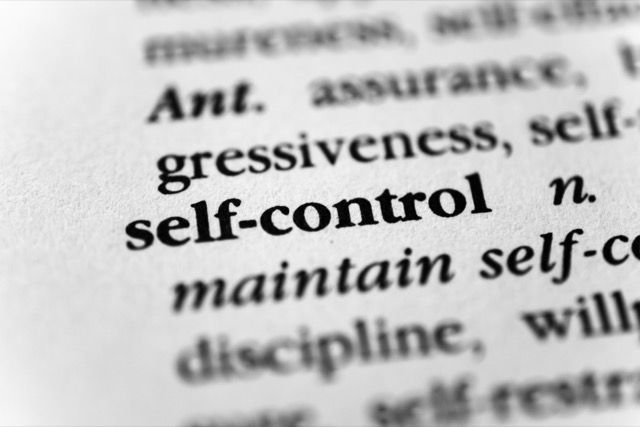Setting New Year's resolutions is a great way to start the year off on the right foot: you need to think about how last year went, identify some achievable goals, and make specific plans on how to meet them. Classic self-improvement stuff.
But now that January's over, it's likely that a lot of resolutions have fallen by the wayside, or that you've slowed your progress as real life gets in the way of your ideal life. Here's what you need to do to take stock of your resolutions and figure out the best way to keep them going through the rest of the year.
Why Do People Have Difficulty with Resolutions?
Before getting into the details of your own resolution, it's a good idea to understand why it's difficult to stick with New Year's resolutions. There are a lot of different factors that contribute to it, but the main issue likely lies with self-control: it's hard to continually exercise the mental effort that you need to stick with your diet, keep exercising, read more books, or whatever else your resolution may be.
Willpower is a limited resource, and working on a resolution exhausts it.
In short, sticking with your resolutions is difficult. But, if you've slipped or completely abandoned your resolution this year, you're not alone, and you're not a failure.
Psychology tells us that sticking with goals, especially if they require a lot of self-control, is quite difficult, and we can only do it for so long without taking specific steps to make it easier. So don't beat yourself up. Instead, be proactive.
Assessing Your Progress
How are you doing on your resolution?
Did you set a specific, measurable goal? Did you have short-term goals, like losing a couple pounds each month, reading a book every week, or limiting yourself to $50 on video games per month?
If not, now is the time to set those specific sub-goals. Being able to measure your progress on your resolution is crucial to assessing your success and making it easier to continue moving forward.
Set a weekly or monthly goal today. Don't worry about what you accomplished or didn't accomplish in January, but decide on a goal you think is sustainable throughout the rest of the year.
This might not apply when you set a goal that doesn't translate well to metrics, like "Stop getting angry at bad customer service agents"; though you may be able to find a way.
You could use the principles of the Five Minute Journal to note your progress, for example (the Five Minute Journal app is currently being redesigned, and it'll be back in the App Store soon).
Reflecting Honestly
Now that you have an idea of how successful you've been, it's time to ask yourself the hard question: why?
If you've had difficulty, why has it been hard? Do you find that you're tired when you get home from work, so you don't want to cook dinner and you end up ordering pizza? Do you call customer service when you don't have much time, so you're feeling impatient? Do you just forget about your goal of spending more time doing the things you love?
Take a little bit of time to journal about why you've been successful or less than successful. You might even want to think about it for a couple days to really get at the issues that are going to be useful for you to keep in mind going forward.
I highly recommend the Day One app, which makes it easy to get going. When you don't want to take the time to reflect and write down your thoughts long-hand, you can use a system like Bullet Journal, which is easy to use on the go with apps like Evernote and OneNote.
Update Your Plan
Now we get to the important part of this whole process. Reviewing and updating your plan is a good practice for any goal, but it's especially important when you have a goal that spans an entire year. I'll address a few common difficulties first, and then offer some more general advice.
Lack of Motivation
Everyone struggles with motivation sometimes; self-control and self-motivation are very closely linked, and you can only do so much of either. So why not take the "self" out of motivation? Find a way for someone else to keep you accountable.
Find a friend or a whole group of people who have the same or similar resolutions and talk to them regularly to stay accountable (and keep them accountable, too). The /r/Resolutions sub-Reddit is a great place to hang out with a lot of other people working toward their goals, and a lot of other sub-reddits like /r/Fitness, /r/Dieting, /r/Books, /r/GetMotivated, and /r/SelfImprovement can provide inspiration and useful tips.
For major motivation, there are a few apps that make you put money on the line, like GymPact and stickK. The thought of losing money because you're not moving toward your goals can be very motivating!
Another strategy for increasing your motivation is to make sure you have regular successes. Making a notable step toward your goals is sure to give you a motivational boost. But if you're having trouble motivating yourself to work toward your goals, how will you achieve success?
Micro-goals (or micro-habits, as we've written about previously) will be a huge help.
Set a small goal, one that you can definitely achieve within a couple days and that will help move you toward your larger goal. Set these regularly, and you'll keep progressing.
Mark off your progress with a free goal tracker like Joe's Goals, 21habit [Broken URL Removed], or Disciplanner to remind yourself that you're doing well. You can also use a simpler solution, like marking off your progress on Google Calendar or an Excel spreadsheet.
Lack of Self-Control
I really sympathize with this one. Self-control is something that comes and goes in phases with me; sometimes I feel great about resisting temptation, and sometimes I'll just eat an entire frozen pizza instead of making a salad. The key to managing your self-control is to manage willpower. Fortunately, there are a number of ways you can use technology to manage your willpower.
For example, you can use Victories [No Longer Available] to provide yourself with some extrinsic motivation to exercise self-control — win battles, gain levels, and check out analytics on your goals.
Habitica (formerly HabitRPG) is another fun way to turn your goals into games, which can make it easier to muster the necessary self-control and motivation you need.
Finding ways to reduce the number of things you need to do each day can save mental energy that you can then devote to self-control. Automating daily tasks with Zapier, for example, can make dealing with email, Slack, or Google Analytics much easier and less mental-effort-intensive.
You can even automate your Android phone with TaskBomb to open specific apps or take actions at certain times. If LoseIt! opens every morning when you wake up, you'll be much more likely to actually use it!
Also, remember that willpower is like any other skill — you need to practice it to get better. Every time you resist temptation, whether that's to go home instead of going to the gym, to eat a burger instead of a salad, or to drink water instead of coffee, you're improving the strength of your willpower.
Forgetfulness
To work on your resolution, you need to remember that you set the goal in the first place. Fortunately, technology can help you remember anything. Most task-list managers can send you notifications, and if you want to get notifications on all of your devices, you can integrate Wunderlist with Google Calendar (don't forget to use its really useful folders, too). You can even add reminders directly to Google Calendar if that works better for you.
General Tips
Updating your plan with additional goals related to self-control, motivation, remembering, or anything else can seem like it will only make things more difficult—now you have two things to work on instead of one. But by getting help on your willpower and motivation using something as simple as an app, a Facebook group, or a regular catch-up over coffee can make your resolution significantly more manageable.
Remember that a wide variety of resources can help you stay focused: from motivational TED talks to gamification apps (Habitica has made a huge difference in my own daily routine, and I highly recommend it). A New Year's resolution is like a year-long project, and you can use a lot of the same motivational techniques to succeed.
And don't forget to take advantage of anything you can automate.
Automating your finances with apps like Digit and Betterment can go a long way toward helping you meet your goals. Use IFTTT with your FitBit to get useful notifications and reminders. Sign up for a great newsletter like Now I Know to send you interesting information every day so you can keep learning all year.
Anything you can automate will help you save mental energy, keep you from forgetting, and take motivation out of the equation.
Your Resolution Check-In
Ultimately, you have to find your own productivity framework. Go for an analog system or digital tools. But try to get back on the horse.
How did your New Year's resolution check-in go? Are you doing well or struggling? What systems will you put in place to help you get moving? Share below and start taking advantage of social accountability right away!
Image Credits: Syda Productions via Shutterstock.com, totallyPic.com via Shutterstock.com, A. and I. Kruk via Shutterstock.com, Erce via Shutterstock.com, CREATISTA via Shutterstock.com,







